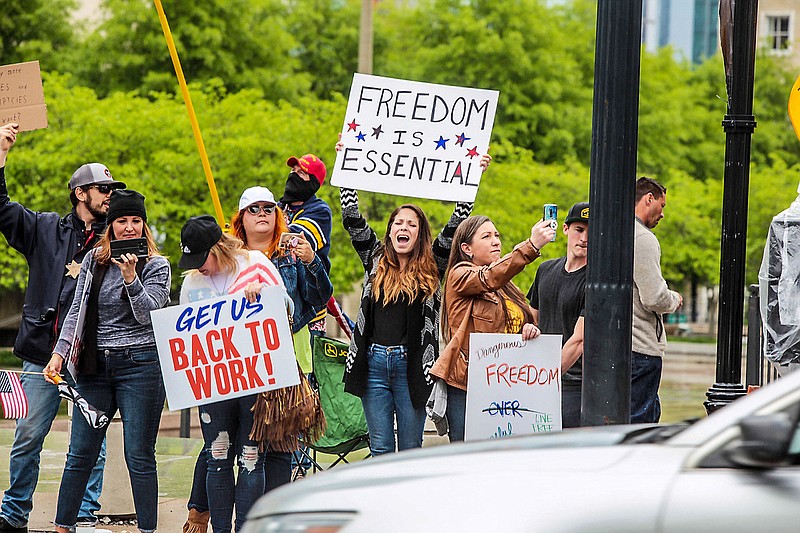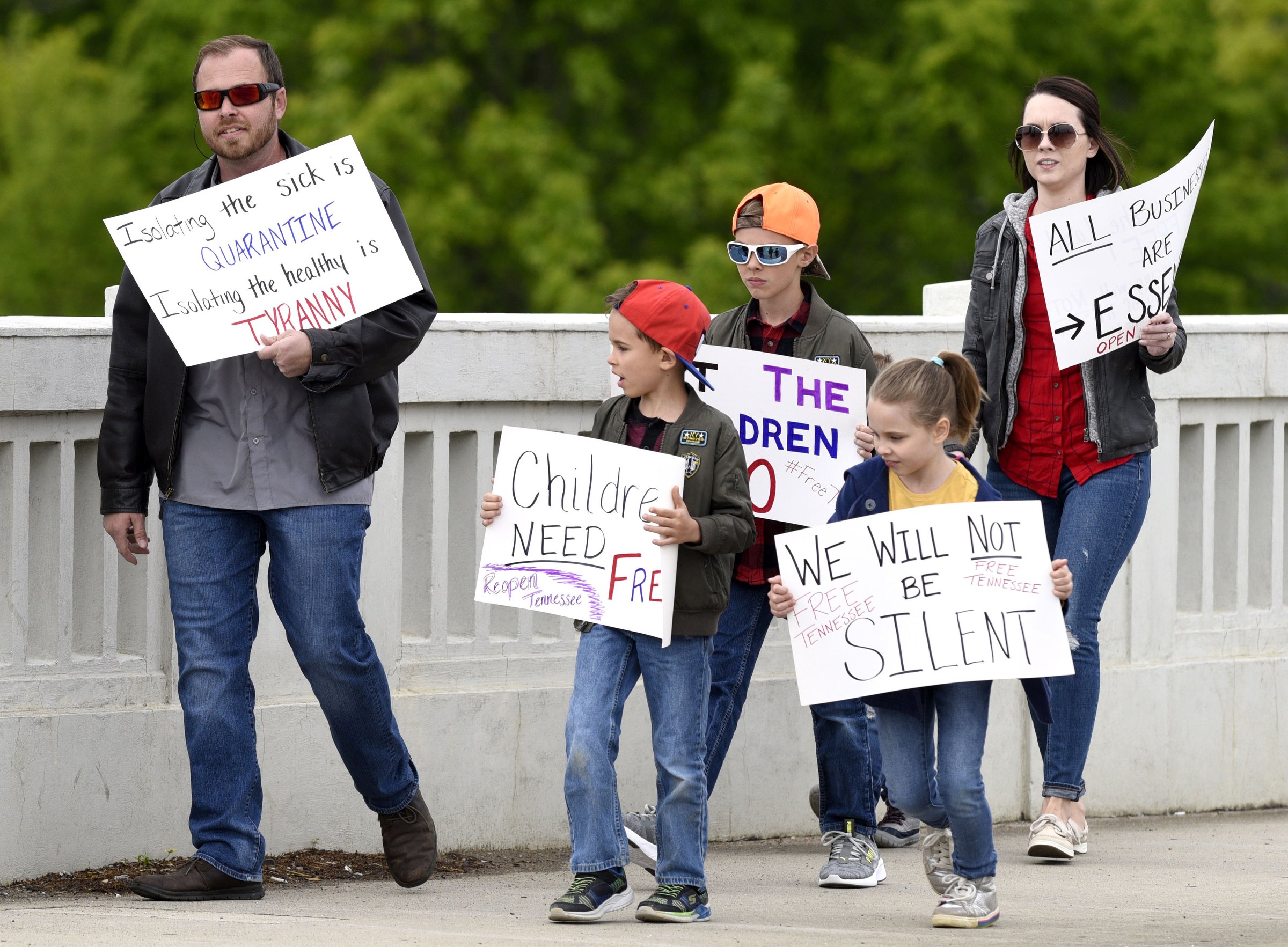Kimberly Edwards and her husband sat down at the hand-me-down farm table in their kitchen in Nashville, Tennessee, opened a laptop and launched an online Zoom meeting for about 30 friends.
Edwards, 34, a mother of three with a musician husband, is an Airbnb host. A native Chicagoan, she and her husband moved to Nashville for the music and tourism industries.
Looking into the faces of her friends on Zoom, Edwards began, "Has everyone seen Gov. [Bill] Lee's announcement about the extension of the shutdown and the next 18 months of social distancing?"
The Zoom faces nodded.
For Edwards, it didn't take long for the coronavirus shutdown to economically devastate her family. With no tourism or live music in Nashville, the family tried to wait out the first two weeks of the shutdown, but with Lee's announcement, Edwards said her family's welfare was at stake.
"The night that Gov. Lee extended the executive order, about 30 of my Facebook friends decided to rally for our freedom," Edwards said, "so we hopped on Zoom and planned two rallies, one for cities across Tennessee and then one for our state. I was appointed the point person, and it just spread. We had close to 2,000 people show up for the city rallies."
This is how the #FreeTN protest movement was formed in one week: a Zoom meeting, a Facebook page and a terrified mother with friends.
"We've become very afraid. I think, the first two weeks, we were in it with everyone and supportive of protecting people and could hunker down," Edwards said. "After that, I became very depressed and angry. I'm not going to be safe if I can't provide for my family and keep my home."
Edwards and her friends are not alone. The growing backlash against shelter-in-place orders and other local and state measures during the coronavirus crisis is fomenting a protest movement nationwide.
Over the past two weeks, protesters marched across the country - flouting social-distancing measures - and demanded what they view as their constitutional rights against rules they see as arbitrary, such as Chattanooga's ban on drive-in church services, which was in place while drive-in restaurants remained open.
On Monday, the #FreeTN protesters will gather at the State Capitol for a rally that will include as its keynote speaker Robert Barnes, a constitutional attorney who splits his time between Chattanooga and California, with a growing national presence.
Barnes is part of the legal team representing infamous internet personality Alex Jones in First Amendment lawsuits. Jones features Barnes on his streaming platform with the coronavirus-focused show "American Countdown" and was recently labeled by The New York Times as a "conspiracy monger." He is one of the most controversial voices in the "alt-right" movement.
Barnes sued the city of Chattanooga on behalf of a church member deprived of a drive-in service on Easter Sunday. Three lawsuits alleged Mayor Andy Berke violated the U.S. Constitution by temporarily banning drive-in church services to stop the spread of COVID-19. Berke has since lifted the ban.
Barnes launched similar coronavirus shutdown litigation in Michigan and has lawsuits in the works in Virginia, Maine, Texas, California, New Jersey and Nebraska. Barnes expects to file more suits in Chattanooga.
While Lee announced last week that businesses can reopen on May 1 and Hamilton County Mayor Jim Coppinger followed Lee's lead and said the county can reopen, Berke announced that the city of Chattanooga will not commit to an "arbitrary" re-opening date.
Berke's departure from the state and county announcements was featured on Don Lemon's CNN show on Tuesday. While Lemon supported the mayor, many city residents do not and have taken to the #FreeTN Facebook page to demand reopening of the city. Berke acknowledged the confusion in his CNN appearance when questioned by Lemon.
"So Tennessee will open, the county surrounding you will open, and Georgia that borders you will be open, but Chattanooga will not be open?" asked Lemon.
"I know, it's very confusing," Berke said.
In an email, Berke said he understands the disruption some city residents feel.
"Each of the executive orders we've issued represents the minimum amount of intrusion that we feel we can make into people's lives while still accomplishing the larger goal behind them - protecting the lives and livelihood of our community," Berke said.
RIGHTS OR PERMISSIONS?
The social media feeds that have fueled the protest movements often cite legal, economic and epidemiological analysis.
"If constitutional rights can be taken away whenever there is a crisis, then they are not rights at all - they are permissions," said Brandon Lewis, a Chattanooga #FreeTN leader and a small business owner.
Lewis, 40, a husband and father of two, is the owner of Painters Academy in Chattanooga. He has announced an effort to gather signatures to launch a recall of the mayor.
"Right now, we have lost approximately 25,000 jobs in Hamilton County, yet have only seen about 115 cases of coronavirus," Lewis said. "This is a net loss of 217 jobs per case and has resulted in one out of nine citizens being unemployed. Businesses are shuttering, schools are closed and churches are empty. This is destroying the fabric of our culture and our country."
Christine Black, 66, owner of an East Brainerd hair salon, is concerned about the health crises posed not by the coronavirus but by economic collapse. Black reached out to Barnes to seek advice for legal representation for her Chattanooga business but has yet to file legal action.
"[Berke is] causing thousands of business owners to lose their customers, their employees, their livelihoods," Black said. "They will all go to other parts of our region outside of the city limits. When you can't earn money, people lose lives.
"I haven't met anyone with coronavirus or know anyone who has died of coronavirus," Black said. "I have known people who have committed suicide or know people whose family members have died of drug overdoses."
Key leaders in the fight against coronavirus disagree with the capitulation to economic fallout and what these experts view as risky protests and too-soon re-openings.
On Monday, following the April 19 protests, Dr. Anthony Fauci, head of the National Institute of Allergy and Infectious Diseases, warned against a "backfire" of a coronavirus spike due to protests.
"Clearly this is something that is hurting us from the standpoint of economics and the standpoint of things that have nothing to do with the virus, but unless we get the virus under control, the real recovery economically is not going to happen," Fauci said on "Good Morning America."
"So what do you do if you jump the gun and go into a situation where you have a big spike, you're going to set yourself back," he said. "So as painful as it is to go by the careful guidelines of gradually phasing into a reopening, it's going to backfire. That's the problem."
'I DESERVE CONSIDERATION'
Rebecca DeBord, 66, a Chattanooga classical musician, supports Berke's actions.
"All Americans are guaranteed by the constitution the right to protest things they do not like," Debord said. "I was part of the women's march in 2017, and I believe strongly in the right to assert your opinions, but I also believe that my rights can't infringe upon your rights, and in the middle of the health pandemic, when I have underlying conditions and, because of my age, I deserve consideration just like you would if you were in my shoes."
Debord thinks the protesters should realize everyone is suffering economically.
"They are shortsighted in thinking they are the only ones who are suffering," she said. "I lost my piano students, I've lost my job playing the piano, and my stock portfolio is taking a beating. I too am suffering these economic repercussions."
Though economics fuel much of the fervor online, coronavirus restrictions on people's everyday lives have drawn concern from U.S. Attorney General William Barr, who warned that the U.S. Department of Justice might get involved in citizen-launched lawsuits.
Barnes said he is willing to represent any Chattanooga citizen who has a legitimate civil liberties claim.
A native Chattanoogan, Barnes began his legal career as an associate at the Chattanooga office of attorney John Wolfe, Jr. Though the two sometimes enjoyed healthy debate as colleagues, they have remained friends. Wolfe sees the current legal situation differently than Barnes.
"If there is a compelling state interest, then they can curb free speech and put constraints on it as long as it is narrowly tailored, neutral and there is a compelling state interest at stake," Wolfe said, "And the compelling state interest is a pandemic that has killed 40,000 Americans."
Berke thinks this is a compelling state interest as well. In an email, he said, "My job is to keep making decisions that use data and expert advice to protect the public's health, and I appreciate the support and cooperation of the public - including the business community - so that we can start to lift some of our restrictions when the time is right."
'EXEMPT FROM LOCKDOWN'
Barnes and his plaintiffs feel that democracy itself is more compelling.
"The attorney general recognizes the expression of constitutional liberties should be identified as essential activities exempt from lockdown orders," Barnes said. "It took a revolution and two centuries to forge these liberties that define what it means to be an American. We fought a civil war to restore them and two world wars to keep them. We cannot forfeit them in fear of a virus."
With battle lines drawn, Barnes prepares to address the #FreeTN protesters on Monday at the state Capitol, and the protesters are now getting the attention they wanted. On Friday, The New York Times published a column tracing the emergence of the movement and described it as conservative and funded by right-wing groups.
#FreeTN founder Edwards says that hasn't been her experience.
"I haven't seen a dime from any major backers," Edwards said.
She also takes issue with the conservative label placed on the movement.
"We have Libertarians, Republicans, Democrats, Tea Party, Anarchists - it's quite diverse," she said.
Edwards said the only defining creed of the movement is the U.S. Constitution.
"Because we have these rights, we have these liberties," Edwards said. "The right to peaceably assemble, the right to life and liberty and the right to equal protection under the law. The minute that the executive order decided who was essential and who was not, we lost our right to seek life, liberty and equal protection under the law."
Reach Millicent Smith at rachelmillicentsmith@gmail.com.

